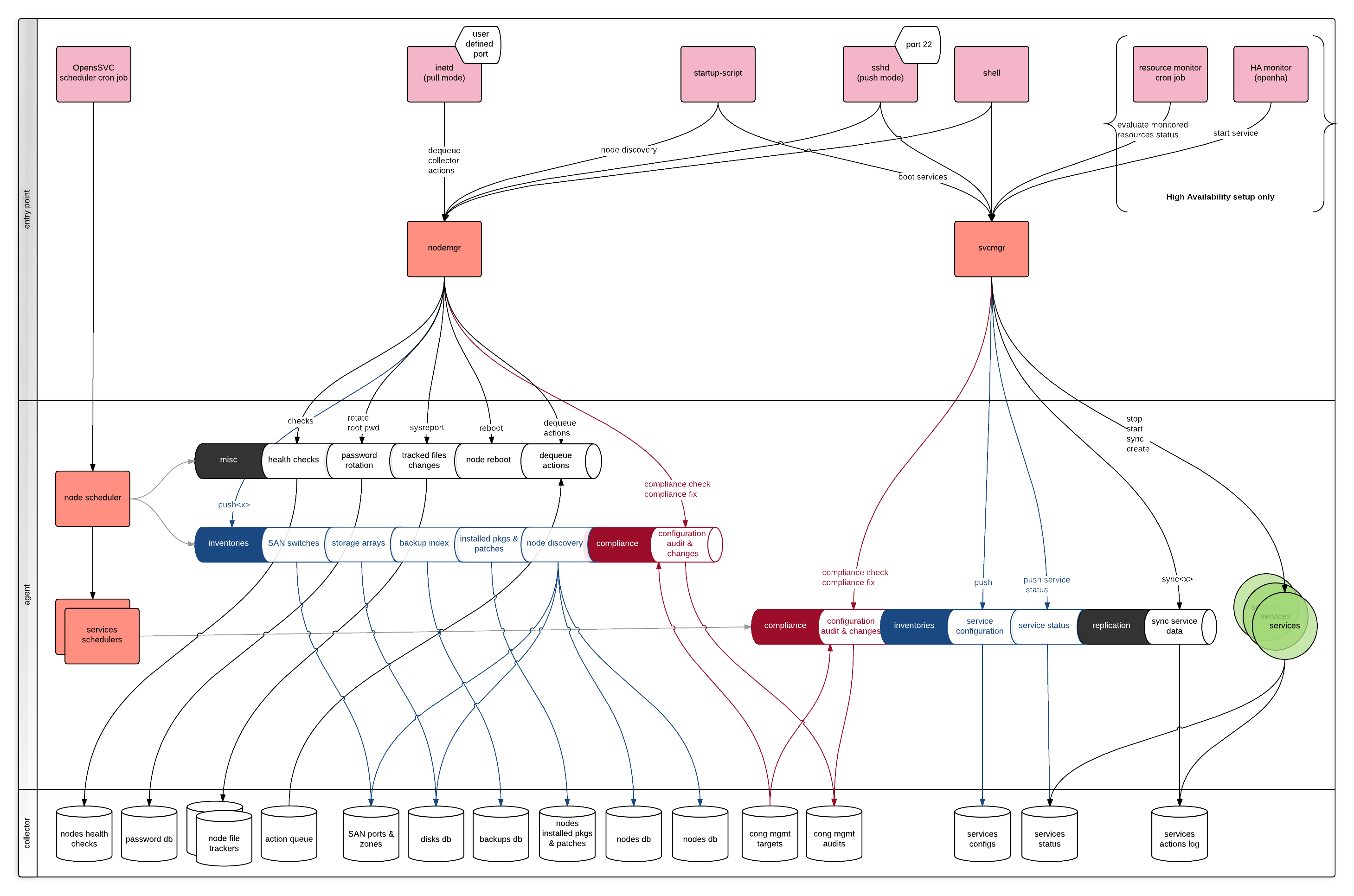Agent architecture¶

The "entry-point" lane shows how the daemon-less OpenSVC agent gets to run.
The system scheduler entry-point¶
The system scheduler entry-point wakes the OpenSVC internal node scheduler, which in turn spawns the service schedulers in threads.
Each task of the node scheduler can be executed directly through the nodemgr command, and each task of the service scheduler can be executed directly through the svcmgr command.
Most tasks produce data sent to the collector for site-level aggregation.
Node scheduler tasks¶
The node scheduler tasks schedules are defined in <OSVCETC>/node.conf. Each task has its own section supporting the schedule parameter. The section name is visible in sudo nodemgr print schedule output in the config parameter column.
$ sudo nodemgr print schedule
action last run config parameter schedule definition
------ -------- ---------------- -------------------
auto_reboot 2015-07-28 17:00:01 reboot.schedule 16:00-17:00@1 sat:last,tue-mon:last * %2+1,feb-apr
auto_rotate_root_pw 2015-02-25 17:17:17 rotate_root_pw.schedule -
checks 2015-09-22 07:50:01 checks.schedule ["16:00-21:00@30 *:last", "! * wed", "*@1"]
compliance_auto 2015-09-22 00:30:03 compliance.schedule 00:00-01:00@61
dequeue_actions 2015-09-22 07:50:01 dequeue_actions.schedule @1
pushasset 2015-09-22 03:00:01 asset.schedule 00:00-06:00@361 mon-sun
pushbrocade 2015-03-04 16:21:25 brocade.schedule -
pushdcs 2015-03-04 16:21:25 dcs.schedule -
pushdisks 2015-09-22 03:30:01 disks.schedule 00:00-06:00@361 mon-sun
pushemcvnx - emcvnx.schedule -
pusheva 2015-02-25 17:17:17 eva.schedule -
pushfreenas - freenas.schedule -
pushhds 2015-03-04 16:21:25 hds.schedule -
pushhp3par 2015-02-25 17:17:11 hp3par.schedule -
pushibmds 2015-03-04 16:21:25 ibmds.schedule -
pushibmsvc 2015-02-25 17:17:16 ibmsvc.schedule -
pushnecism 2015-02-25 17:17:18 necism.schedule -
pushnsr 2015-02-25 17:16:56 nsr.schedule -
pushpatch 2015-09-22 03:20:02 patches.schedule 00:00-06:00@361 mon-sun
pushpkg 2015-09-22 02:50:02 packages.schedule 00:00-06:00@361 mon-sun
pushstats 2015-09-22 07:40:02 stats.schedule ["00:00-23:59@10"]
pushsym 2015-03-04 16:21:25 sym.schedule -
pushvioserver 2015-02-25 17:17:15 vioserver.schedule -
sysreport 2015-09-22 02:00:02 sysreport.schedule 00:00-06:00@361 mon-sun
Service scheduler tasks¶
A service scheduler tasks schedules are defined in <OSVCETC>/<svcname>.env. The section and parameter names are visible in sudo svcmgr -s <svcname> print schedule output in the config parameter column.
$ sudo svcmgr -s testmd print schedule
action last run config parameter schedule definition
------ -------- ---------------- -------------------
compliance_auto 2015-09-22 03:00:02 DEFAULT.comp_schedule 00:00-06:00@361
push_appinfo 2015-09-22 01:11:03 app#1.schedule 00:00-06:00@361
push_appinfo 2015-09-22 01:11:03 app#2.schedule 00:00-06:00@361
push_appinfo 2015-09-22 01:11:03 app#3.schedule 00:00-06:00@361
push_appinfo 2015-09-22 01:11:03 app#4.schedule 00:00-06:00@361
push_env 2015-09-22 03:00:02 DEFAULT.push_schedule 00:00-06:00@361
push_service_status 2015-09-22 07:50:02 DEFAULT.mon_schedule @1
syncall 2015-09-22 08:00:07 sync#1.schedule ["00:00-01:00@61", "01:00-23:59@10"]
syncall 2015-09-22 08:00:07 sync#i0.schedule @2
Here, the push_appinfo and syncall tasks are mapped over respectivelly app and sync resources. Hence their number vary depending on the service configuration.
The inetd entry-point¶
Optionally, users can plug OpenSVC into the system's inetd service. A listening port is allocated to the agent and when the node receives a packet for this port, inetd executes the nodemgr dequeue actions command. This command fetch from the collector the list of agent actions to execute, executes them, and send results to the collector. This is the pull mode.
Alternaltively, the node can be configured to allow direct actions from the collector through ssh and sudo. This is the push mode.
Example configuration for the pull mode and systemd¶
/etc/systemd/system/opensvc-actions@.service:
[Unit]
Description=OpenSVC collector-queued actions handler
[Service]
ExecStart=/usr/bin/nodemgr dequeue actions
RemainAfterExit=yes
/etc/systemd/system/opensvc-actions.socket:
[Unit]
Description=OpenSVC socket to receive collector notifications that actions are queued for the local agent
[Socket]
ListenStream=1214
Accept=yes
Service=opensvc-actions
[Install]
WantedBy=sockets.target
Activation:
# sudo systemctl start opensvc-actions.socket